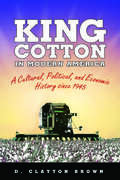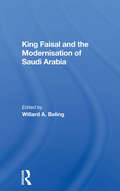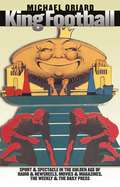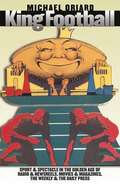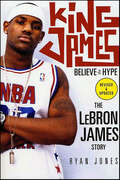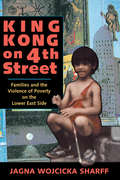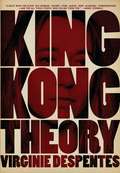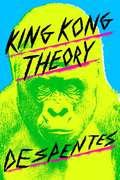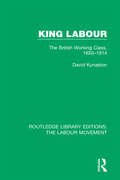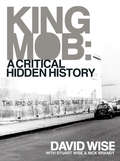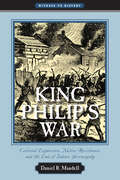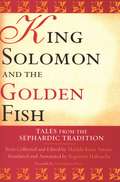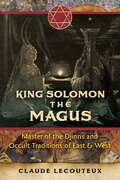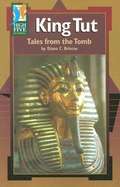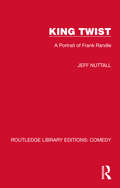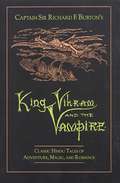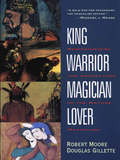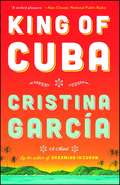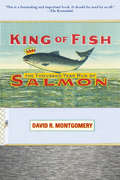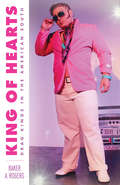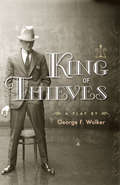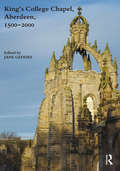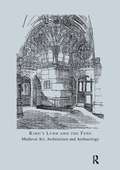- Table View
- List View
King Cotton in Modern America: A Cultural, Political, and Economic History since 1945
by D. Clayton BrownKing Cotton in Modern America places the once kingly crop in historical perspective, showing how "cotton culture" was actually part of the larger culture of the United States despite many regarding its cultivation and sources as hopelessly backward. Leaders in the industry, acting through the National Cotton Council, organized the various and often conflicting segments to make the commodity a viable part of the greater American economy. The industry faced new challenges, particularly the rise of foreign competition in production and the increase of man-made fibers in the consumer market.Modernization and efficiency became key elements for cotton planters. The expansion of cotton- growing areas into the Far West after 1945 enabled American growers to compete in the world market. Internal dissension developed between the traditional cotton growing regions in the South and the new areas in the West, particularly over the USDA cotton allotment program. Mechanization had profound social and economic impacts. Through music and literature, and with special emphasis placed on the meaning of cotton to African Americans in the lore of Memphis's Beale Street, blues music, and African American migration off the land, author D. Clayton Brown carries cotton's story to the present.
King Faisal And The Modernisation Of Saudi Arabia
by Willard A. BelingThe late King Faisal bin Abdul Aziz was born in Riyadh in 1905/6, several years after his father Abdulaziz Ibn Saud had recaptured it from Ibn Rashid. In 1964 he became king of Saudi Arabia, famous for harbouring twenty five percent of the world's oil reserves and hailed as the most powerful Arab ruler in centuries. In 1975, his nephew shot him in
King Football
by Michael OriardThis landmark work explores the vibrant world of football from the 1920s through the 1950s, a period in which the game became deeply embedded in American life. Though millions experienced the thrills of college and professional football firsthand during these years, many more encountered the game through their daily newspapers or the weekly Saturday Evening Post, on radio broadcasts, and in the newsreels and feature films shown at their local movie theaters. Asking what football meant to these millions who followed it either casually or passionately, Michael Oriard reconstructs a media-created world of football and explores its deep entanglements with a modernizing American society.Football, claims Oriard, served as an agent of "Americanization" for immigrant groups but resisted attempts at true integration and racial equality, while anxieties over the domestication and affluence of middle-class American life helped pave the way for the sport's rise in popularity during the Cold War. Underlying these threads is the story of how the print and broadcast media, in ways specific to each medium, were powerful forces in constructing the football culture we know today."[Oriard] captures the self-aggrandizing illogic of the game's cultural role in his absorbing study of early 20th-century culture.--New York Times"This excellent book should be required reading on any American Studies course worth the name. . . . Oriard's detailed and well-written work shows us how the game has been constructed through notions of national, gendered and ethnic--and, as he insists, also class--identities.--Journal of American StudiesIn this landmark work exploring the vibrant world of football from the 1920s through the 1950s, Michael Oriard explores how the mass media shaped and were shaped by the exploding popularity of football. King Football is at once a sweeping cultural history of football, a provocative study of the power of print and broadcast media, and a compelling investigation of American attitudes about race, class, and gender and their relationship to sport.-->
King Football: Sport and Spectacle in the Golden Age of Radio and Newsreels, Movies and Magazines, the Weekly and the Daily Press
by Michael OriardThis book is a study of "King Football" from the 1920s through the 1950s, a period mostly marked by the enthusiasm of the editors of Sport Story and the Football News, but rarely without the censure of a Reed Harris or James Wechsler. The underlying question is a simple one: what did football mean to the actual millions who followed it, whether casually or passionately, during this period?
King James: Believe the Hype—The LeBron James Story
by Ryan JonesKing James offers a fascinating, inside look at the early years of the king of the basketball court, Lebron James.LeBron is a six-foot-eight gift from the basketball heavens. In the early 2000's, at St. Vincent-St. Mary's, he was the undisputed finest high school player in America. The "Chosen One" NBA scouts drooled over, corporations dreamt of, event promoters begged for, and now NBA fans clamor after. With appearances on the cover of Sports Illustrated and features on ESPN and in newspapers across the country, never before had a high school basketball player been so highly touted or an eighteen-year-old athlete been the subject of such fascination. In fact, no basketball player in the world experienced this level of attention. But believe the hype: there is no denying that LeBron James is a force on the basketball court, and his rags-to riches story is the stuff that dreams are made of.Author Ryan Jones has written a book that incorporates everything during the early reign of King James: the controversy, the athletic potential, the jerseys and the Humvee, the hobnobbing with the world's most famous stars, the money, and, of course, the game. This is a book for every fan of LeBron James and for anybody interested in reading about the NBA basketball legend in the making.
King Kong On 4th Street: Families And The Violence Of Poverty On The Lower East Side (Institutional Structures of Feeling)
by Jagna Wojcicka SharffThis book chronicles an ethnographic teams involvement over a span of fifteen years with the people of a poor, largely Puerto Rican neighborhood in New York City. Jagna Sharff focuses on a group of families who live within a radius of a few blocks of her storefront office, especially the children who come first to interact with the team. She contrasts her teams initial observations of how people grapple with daily life with the residents expressed hopes and dreams in a community lacking jobs but rife with underground activities. Through lively and interconnected stories, she traces over time the fate of the neighborhood and the outcomes for individual children and adults during an era when the local and national policy of the war on poverty was transmuted into a war against the poor. The books lyrical, cinematically vivid style makes it appealing both for college social science courses and for the general public. }In King Kong on 4th Street, Jagna Sharff chronicles an ethnographic teams involvement over a span of fifteen years with the people of a poor, largely Puerto Rican neighborhood in New York City. Anchoring her observations in field notes, she recounts the joys, fears, and disappointments of daily life as well as the drama of large events. Arson, the murder of a popular local teenager, the mobbing of a grocery store as an act of retribution for his deathall are projected onto a canvas of shifting local and national policies toward poor people and neighborhoods.Sharff provides new insights into gender and family roles, how adaptations to available resources from the welfare state may shape the membership of households, and how children may be trained for specific adult roles that will advance the familys well-being. She also reveals how the underground economy, particularly the commerce in drugs whose profits are realized outside of the neighborhood, undermines neighborhood-wide solidarity and sends people scrambling against one another for jobs in the quasi-licit and illicit sector. Following the lives of a number of families into the next generation, Sharffs ethnographic team documents how external political decisions that change the war on poverty into a war on the poor affected them. Paramilitary sweeps of the neighborhood, in tandem with gentrification and declining social services, produce severe dislocations and relocation to homeless shelters, welfare hotels, and prisons. But the reality described is not all grim.The books vivid style shows that life is more than grim reality. People get real pleasure from raising children and taking part in the human drama around them. Kinfolk, real and fictive, keep each other afloat and reconnected to new neighborhoods and opportunities, including that of upward mobility through religious conversion. Adults and children achieve satisfaction and a measure of security through grit, wit, and acts of heroism and solidarity. }
King Kong Theory
by Stéphanie Benson Virginie Despentes"King Kong Theory is essential reading!"--Dorothy Allison"King Kong Theory brings to mind Solanas's SCUM Manifesto, Muscio's CUNT, and Plath's The Bell Jar--feminist eloquence without restraint. You will love it."--Susie Bright"Finally someone has done it! The feminist movement needs King Kong Theory now more than ever. A must-read for every sex worker, tranny, punk, queer, john, academic, pornographer--and for all those people who dislike them too."--Annie SprinkleWith humor, rage, and confessional detail, Virginie Despentes--in her own words, "more King Kong than Kate Moss"--delivers a highly charged account of women's lives today. She explodes common attitudes about sex and gender, and shows how modern beauty myths are ripe for rebelling against. Using her own experiences of rape, prostitution, and working in the porn industry as a jumping-off point, she creates a new space for all those who can't or won't obey the rules.Virginie Despentes is the writer and co-director of Baise-Moi, the controversial rape-revenge novel that became the basis for a film by the same name. Born in Paris, she now lives in Barcelona.
King Kong Theory
by Virginie DespentesOut of print in the U.S. for far too long, writer and filmmaker Virginie Despentes’s autobiographical feminist manifesto is back—in an improved English translation—“blistering with anger, and so precisely phrased that it feels an injustice to summarize it” (Nadja Spiegelman, New York Review of Books).I write from the realms of the ugly, for the ugly, the old, the bull dykes, the frigid, the unfucked, the unfuckable, the hysterics, the freaks, all those excluded from the great meat market of female flesh. And if I’m starting here it’s because I want to be crystal clear: I’m not here to make excuses, I’m not here to bitch. I wouldn’t swap places with anyone because being Virginie Despentes seems to me a more interesting gig than anything else out there.Powerful, provocative, and personal, King Kong Theory is a candid account of how the author of Baise-Moi and Vernon Subutex came to be Virginie Despentes. Drawing from personal experience, Despentes shatters received ideas about rape and prostitution, and explodes common attitudes about sex and gender.An autobiography, a call for revolt, a manifesto for a new punk feminism, King Kong Theory is Despentes’s most beloved and reviled work, and is here made available again in a brilliant new translation by Frank Wynne.
King Labour: The British Working Class, 1850-1914 (Routledge Library Editions: The Labour Movement #23)
by David KynastonFirst published in 1976. This book covers working-class history from the decline of Chartism to the formation of the Labour Party and its early development to 1914. It gives a historical perspective to the essentially defensive, materialist orientation of twentieth century working-class politics. David Kynaston has sought to synthesise the wealth of recent detailed research to produce a coherent overall view of the particular dynamic of these formative years. He sees the course of working-class history in the second half of the nineteenth century as a necessary tragedy and suggests that a major reason for this was the inability of William Morris as a revolutionary socialist to influence organised labour. The treatment is thematic as much as chronological and special attention is given not only to the parliamentary rise of Labour, but also to deeper-lying intellectual, occupational, residential, religious, and cultural influences. The text itself includes a substantial amount of contemporary material in order to reflect the distinctive ‘feel’ of the period. The book is particularly designed for students studying the political, social and economic background to modern Britain as well as those specialising in nineteenth-century English history.
King Midas and the Golden Touch
by Kathryn HewittA king who wishes for the golden touch is faced with its unfortunate consequences.
King Mob: A Critcal Hidden History
by David Wise"I met a prostitute - Angela W - from the fishing port of Grimsby on the mouth of the Humber in the North of England. I instantly fell in love with her in an all consuming way. The pain inside my body, so massively accumulated with the death of hopes for the social revolution...was wrenched away from me as she slowly...shambled towards me." So begins Dave Wise's first hand account of King Mob, the late 60s London based political grouping formed after core members were excluded from the Situationist International. From a radical, working class perspective, Wise recounts their attempts to move "from the Situationist salon to the street", whilst frankly outlining identifying tactical, strategic and theoretical holes in the groups' day to day actions. Plans to blow up waterfalls, getting arrested on demos dressed as pantomine horses (the back end got off in court, on the grounds he didn't know what the front end was doing...), sharing oversized baked bean costumes with ultra-Maoists on Vietnam marches. Getting high and hungrily devouring Coleridge, De Quincey, Rimbaud, Marx, De Sade, Breton, Joyce and Hegel. Urinating over the lectern whilst declaring the death of art at the 1968 English Surrealist convention, being (falsely) put in the frame for the 1969 Newcastle School of Art firebombing; perhaps most infamously dressing up as Santa Claus in Selfridges toy dept, Xmas '69, and watching the chaos of consumerism unfold before them as crying children had the King Mob freely-gifted toys wrenched from their arms by employees. As the downturn of the early 1970's approached, and with it the apparent end of any hope for imminent social revolution, some of King Mob drifted off into various strands of bourgeois counterculture, whilst others faced up to the harsher realities of the "capsized utopia". Some didn't make it through, as an at times unintentionally moving epilogue here recalls. "A Critical Hidden History" is a living, breathing account of a brief moment in time, when the light got through the cracks in the wall, and a new world felt possible. As we career into the 21st century, the relevance of the playful, life affirming, non-hierarchical, anti-capitalists King Mob seems as great today as it ever did.
King Philip's War: Colonial Expansion, Native Resistance, and the End of Indian Sovereignty (Witness to History)
by Daniel R. Mandell2010 Outstanding Academic Title, Choice MagazineKing Philip's War was the most devastating conflict between Europeans and Native Americans in the 1600s. In this incisive account, award-winning author Daniel R. Mandell puts the war into its rich historical context.The war erupted in July 1675, after years of growing tension between Plymouth and the Wampanoag sachem Metacom, also known as Philip. Metacom’s warriors attacked nearby Swansea, and within months the bloody conflict spread west and erupted in Maine. Native forces ambushed militia detachments and burned towns, driving the colonists back toward Boston. But by late spring 1676, the tide had turned: the colonists fought more effectively and enlisted Native allies while from the west the feared Mohawks attacked Metacom’s forces. Thousands of Natives starved, fled the region, surrendered (often to be executed or sold into slavery), or, like Metacom, were hunted down and killed.Mandell explores how decades of colonial expansion and encroachments on Indian sovereignty caused the war and how Metacom sought to enlist the aid of other tribes against the colonists even as Plymouth pressured the Wampanoags to join them. He narrates the colonists’ many defeats and growing desperation; the severe shortages the Indians faced during the brutal winter; the collapse of Native unity; and the final hunt for Metacom. In the process, Mandell reveals the complex and shifting relationships among the Native tribes and colonists and explains why the war effectively ended sovereignty for Indians in New England. This fast-paced history incorporates the most recent scholarship on the region and features nine new maps and a bibliographic essay about Native-Anglo relations.
King Solomon and the Golden Fish: Tales from the Sephardic Tradition (Raphael Patai Series in Jewish Folklore and Anthropology)
by Reginetta Haboucha Matilda Koén-SaranoOrality has been central to the transmission of Sephardic customs, wisdom, and values for centuries. Throughout the Middle Ages, Spanish Jews were known for their linguistic skills, and as translators and storytellers they were the main transmitters of Eastern/Islamic culture to the Christian world. Derived from a distinguished heritage, Judeo-Spanish storytelling has evolved over a five-hundred-year historical journey. Constant contact with the surrounding societies of the past and with modern Israeli influences, making it more universal than other Sephardic oral genres. Told in order to entertain but also to teach, Judeo-Spanish folktales convey timeless wisdom and a colorful depiction of Sephardic communities up to the first half of the twentieth century.King Solomon and the Golden Fish is a selection of fifty-four folktales taken from Matilda Koén-Sarano's collection of stories recorded in Ladino (Judeo-Spanish) and translated by Reginetta Haboucha into fluent and idiomatic English that preserves the flavor and oral nuances of each text. Haboucha provides commentary and annotations to the folktales that enlighten both the academic and the lay reader, making this book at once appealing to scholars and enjoyable for the general public. King Solomon and the Golden Fish is divided into six main thematic sections: Supernatural Tales, Tales of Fate, Tales of the Prophet Elijah, Romantic Tales, Tales of Cleverness and Wisdom, and Jokes and Anecdotes. These folktales remain a powerful link between modern-day Spanish Jews and the Hispano-Jewish legacy--this collection passes along that legacy and provides a source of the customs and values of Sephardic Jews.
King Solomon the Magus: Master of the Djinns and Occult Traditions of East and West
by Claude Lecouteux• Explores the schools of Solomonic magic around the world and works such as The Greater and Lesser Keys of Solomon the King and The Hygromancy of Solomon • Examines Solomon&’s magical possessions, including his famous ring that gave him command over animals, weather, demons, genies, and djinns, as well as his amulets, remedies, exorcisms, and charms • Looks at the extensive presence of Solomon in folklore around the world, including in Armenia, Malaysia, Russia, Bulgaria, Morocco, India, and Egypt Looking at the Solomonic magical tradition and Solomon&’s profound influence on esoteric traditions around the world, Claude Lecouteux reveals King Solomon not only as one of the great kings of prehistory but also as the ancient world&’s foremost magician and magus. Examining the primary sources on Solomon, such as the Bible, the Koran, and the writings of Flavius Josephus, the author explores Solomon&’s judgments, his explorations, his literary and scientific works (including an herbal), and his constructions beyond the eponymous temple, such as the copper city in Andalus built by the djinns and the baths of Sulayman. He also looks at Solomon&’s magical possessions, such as his famous ring and the Philosopher&’s Stone. The author examines the supernatural powers granted to Solomon by his ring, which he received from the angel Gabriel, including command over animals, weather, and demons, and explores in detail Solomon&’s power over genies and djinns.Following the esoteric threads hidden within the primary sources on Solomon, Lecouteux reveals the work of Solomon the Magician, exploring his amulets, remedies, exorcisms, charms, and his influence on Arab and Western magic. Providing illustrations of sigils, talismans, and other magic symbols related to Solomon, the author examines the schools of Solomonic Folkloremagic and works such as The Greater and Lesser Keys of Solomon the King and The Hygromancy of Solomon. He then looks at the extensive presence of Solomon in folklore worldwide, including in Armenia, Israel, Malaysia, Eastern Europe, Russia, Morocco, India, Mongolia, and among the Abyssinians of Ethiopia and the Copts in Egypt. He also looks at Solomon&’s role within the Bulgarian tradition from which the Cathars derived. Painting an in-depth portrait of Solomon the Magician-King, Lecouteux reveals how this legendary magus left a deep impression upon the occult, magical traditions, and philosophies of the ancient world that can still be felt to this day.
King Tut: Tales From the Tomb
by Diana C. BriscoeReaders of all ability levels will want to read these high-low books from 5 high-interest nonfiction subject areas: sports, history, biography, adventure, and science. Each easy-to-read book explores a fascinating narrative account of the subject. This all-new series features historical photographs, full-color graphics, glossary words on each page, and a contemporary chapter-book format. Copyright © Libri GmbH. All rights reserved.
King Twist: A Portrait of Frank Randle (Routledge Library Editions: Comedy)
by Jeff NuttallBorn in Wigan in 1901 and a childhood friend of George Formby, who was later to become his chief rival, Frank Randle was one of the greatest music-hall comedians of all time. His theatre career started in 1916, when he appeared as an acrobatic artist under the name of Arthur Twist. It was not until the thirties, however, that he achieved his greatest popularity and notoriety as a comedian whose wild, manic temperament introduced a fresh note of invention into popular entertainment. For ten years he ran his own touring company, Randle’s Scandals, playing to enthusiastic audiences all over the country. He also made a number of shoe-string movies and was the star of Blackpool’s most distinguished summer-season show. During the early fifties his health declined and he died in Blackpool in 1957. Originally published in 1978, Jeff Nuttall’s account of Frank Randle is both a portrait of a ‘very, very, funny man’ and the story of his own search as he pieced that portrait together by talking to Randle’s acquaintances, friends, colleagues and relations. What emerges from his narrative is a beautifully recorded analysis of the ways in which working-class values are expressed in popular entertainment and are thus ritualised by it. The image Nuttall builds of Randle also allows him to explore the perennial theme of the clown as outsider and, with the passing of Randle, he acknowledges the passing of a certain naïve optimism which Randle so expressively embodied.
King Vikram and the Vampire: Classic Hindu Tales of Adventure, Magic, and Romance
by Captain Sir BurtonTranslated by the noted Victorian Orientalist, Sir Richard F. Burton, from the original Sanskrit, these ancient Indian folk tales influenced such later works as 1001 Arabian Nights and Boccaccio's Decameron. First published in 1870, these stories will entertain and delight modern readers while illuminating the life and customs of classical India.
King Warrior Magician Lover: Rediscovering the Archetypes of the Mature Masculine
by Robert Moore Douglas GilletteThe bestselling, widely heralded, jungian introduction to the psychological foundation of a mature, authentic, and revitalized masculinity.
King of Cuba
by Cristina GarciaTold with wry wit and keen insight, this entertaining and richly satisfying story about a fictionalized Fidel Castro and an octogenarian Cuban exile obsessed with seeking revenge against the dictator--from the National Book Award finalist and author of Dreaming in Cuban. El Comandante, an aging Castro-like dictator shambles about his mansion in Havana, visits a dying friend, tortures hunger strikers in one of his prisons, and grapples with the stale end of his life that is as devoid of grandeur as his nearly sixty-year-old revolution. Across the waters in Florida, Goyo Herrera, a Miami exile in his eighties, plots revenge against his longtime enemy--the very same El Comandante--whom he blames for stealing his beloved, ruining his homeland, and taking his father's life. Shifting between the two men with great resonance and humor, and peppered with the rabble of other Cuban voices that create a patchwork of history's unofficial stories, García's novel plumbs the passions and realities of these two Cubas--on the island, and off. Writing at the top of her form, García returns to the territory of her homeland and her bestselling novel Dreaming in Cuban.
King of Cuba: A Novel
by Cristina GarciaA "darkly hilarious" (Elle) novel about a fictionalized Fidel Castro and an octogenarian Cuban exile obsessed with seeking revenge by the National Book Award finalist Cristina García, this "clever, well-conceived dual portrait shows what connects and divides Cubans inside and outside of the island" (Kirkus Reviews).Vivid and teeming with life, King of Cuba transports readers to Cuba and Miami, and into the heads of two larger-than-life men: a fictionalized Fidel Castro and an octogenarian Cuban exile obsessed with seeking revenge against the dictator. García's masterful twinning of these characters combines with a rabble of other Cuban voices to portray the passions and realities of two Cubas--on the island and off-- in a pulsating story that entertains and illuminates.
King of Fish: The Thousand-Year Run of Salmon
by David R. MontgomeryThe salmon that symbolize the Pacific Northwest's natural splendor are now threatened with extinction across much of their ancestral range. In studying the natural and human forces that shape the rivers and mountains of that region, geologist David Montgomery has learned to see the evolution and near-extinction of the salmon as a story of changing landscapes. Montgomery shows how a succession of historical experiences -first in the United Kingdom, then in New England, and now in the Pacific Northwest -repeat a disheartening story in which overfishing and sweeping changes to rivers and seas render the world inhospitable to salmon. In King of Fish, Montgomery traces the human impacts on salmon over the last thousand years and examines the implications both for salmon recovery efforts and for the more general problem of human impacts on the natural world. What does it say for the long-term prospects of the world's many endangered species if one of the most prosperous regions of the richest country on earth cannot accommodate its icon species? All too aware of the possible bleak outcome for the salmon, King of Fishconcludes with provocative recommendations for reinventing the ways in which we make environmental decisions about land, water, and fish.
King of Hearts: Drag Kings in the American South
by Baker A. RogersWhile drag subcultures have gained mainstream media attention in recent years, the main focus has been on female impersonators. Equally lively, however, is the community of drag kings: cis women, trans men, and non-binary people who perform exaggerated masculine personas onstage under such names as Adonis Black, Papi Chulo, and Oliver Clothesoff. King of Hearts shows how drag king performers are thriving in an unlikely location: Southern Bible Belt states like Tennessee, Georgia, and South Carolina. Based on observations and interviews with sixty Southern drag kings, this study reveals how they are challenging the region’s gender norms while creating a unique community with its own distinctive Southern flair. Reflecting the region’s racial diversity, it profiles not only white drag kings, but also those who are African American, multiracial, and Hispanic. Queer scholar Baker A. Rogers—who has also performed as drag king Macon Love—takes you on an insider’s tour of Southern drag king culture, exploring its history, the communal bonds that unite it, and the controversies that have divided it. King of Hearts offers a groundbreaking look at a subculture that presents a subversion of gender norms while also providing a vital lifeline for non-gender-conforming Southerners.
King of Thieves
by George F. WalkerNew York City, 1928. Master thief Mac must join an FBI sting operation against a cadre of corrupt bankers. Music, murder, and mayhem ensue, both at the speakeasy where criminals scheme and on Wall Street where financiers conspire. This satirical play with songs exposes the world of corporate crime and, like The Beggar's Opera of 1728 that inspired it, challenges the conservatism that is increasingly apparent today.George F. Walker is one of Canada's most prolific playwrights, having written more than thirty works for the stage since the debut of his first play in 1971. Walker has also spent much of his career writing for radio and television, including for the CBS series Due South and CBC's The Newsroom.
King's College Chapel, Aberdeen, 1500-2000
by Jane GeddesThis new edition is a revised and expanded version of the book produced in 2000 to celebrate the quincentenary of King's College Chapel, Aberdeen. Since then, exciting discoveries have taken place and old ideas have been reappraised. The choir stalls and woodwork have provided a fresh seam of information about the meaning and use of the medieval chapel. Daniel MacCannell has identified new iconography in the stalls. Jane Geddes, prompted by the installation of the new organ, has investigated the original function and appearance of the great pulpitum or screen between the choir and nave and discovered the location of a magnificent lost organ loft. Mary Pryor and John Morrison have examined the great baroque biblical paintings and come up with a totally new interpretation of their iconography and function: a political warning to King Charles II. Easter Smart, the university chaplain, describes the flexible and ecumenical use of the chapel today. The revised edition appears in time to honour the quincentenary of the death of Bishop William Elphinstone, the founder of Aberdeen University, who died in 1514. This book aims to integrate his legacy to the chapel: the liturgy, music, architecture and fittings. Thanks to an unusually tolerant and conservative attitude towards religion at the university following the Reformation, the chapel has survived in a more complete medieval state than any other church in Scotland. The rich archive of university documents show how benign neglect and a fierce pride in their iconic building caused the university to maintain the structure and its furnishings even during the long centuries when it ceased to serve a religious function.
King's Lynn and the Fens: Volume 30 (The\british Archaeological Association Conference Transactions Ser.)
by John McNeillThe fourteen papers collected in this volume explore the medieval art, architecture and archaeology of King's Lynn and the Fens. They arise out of the Association's 2005 conference, and reflect its concern to engage with a broad range of monuments and themes, rather than focusing on a single major building. Within King's Lynn contributors consider the superb 14th-century enamelled drinking vessel popularly known as 'King John's Cup', the former Hanseatic 'Steelyard', the Red Mount Chapel, and the oak furnishings of the chapel of St Nicholas, while the pine standard chest from St Margaret's church is assessed in terms of the importation and distribution of similar chest across England as a whole.Outside King's Lynn there are articles on the historical manipulation of landscapes and buildings at Kirkstead, the 13th-century architecture and sculpture of Croyland Abbey, the 14th-century parish church of St Mary at Snettisham, the tomb of Sir Humphrey de Littlebury at All Saints, Holbeach, the overlooked medieval wall paintings in the Prior's Chapel at Castle Acre, and the late medieval stained glass at Wiggenhall St Mary Magdalen. Finally, there are three papers that look at particular aspects of the ways in which parish churches were financed, embellished and used across the region - in terms of late-12th and early-13th-century patronage, their 12th-century deployment of architectural sculpture, and the types and arrangements of choir stalls that appeared at a parochial level during the later Middle Ages.
